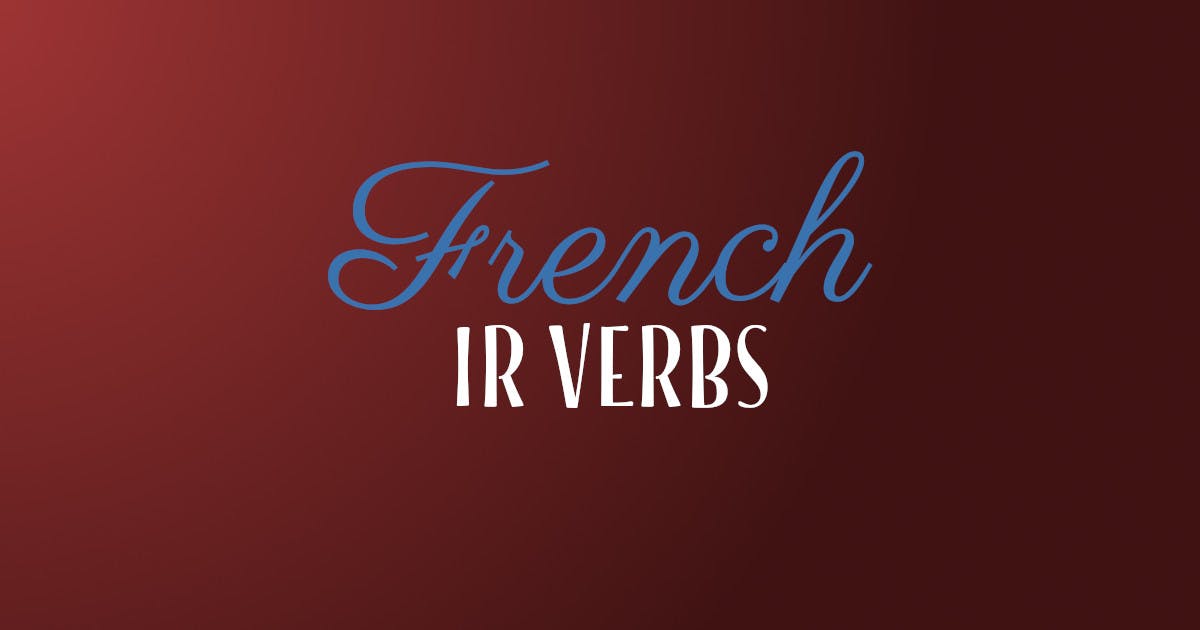How To Conjugate French IR Verbs
The first group of French verbs ended in -ER.
The second verb group (this one) ends in -IR.
The IR verbs follow conjugation rules that are very similar to those of ER verbs as you'll see in a moment.
Not all verbs ending in -IR are necessarily categorized as IR verbs.
If you've already covered and memorized the ER verb conjugations then you shouldn't have any problems with IR verbs.
Let's take a look.
IR verb conjugation rules
First step:
Take the French verb that ends in -ir (e.g. faiblir/to weaken). Remove the -ir ending from the infinitive form. This gives you the essential root we’ll be using to conjugate. Do this for all French verbs in this group. In this case, the root would be [faibl].
Second step:
Add the ending that corresponds to the appropriate French tense and personal pronoun. More language legos!
| Je/I | Tu/you | Il,elle,on/he,she,it | |
|---|---|---|---|
| Présent | faiblis | faiblis | faiblit |
| Imparfait | faiblissais | faiblissais | faiblissait |
| Passé simple | faiblis | faiblis | faiblit |
| Futur simple | faiblirai | faibliras | faiblira |
| Subjonctif présent | faiblisse | faiblisses | faiblisse |
| †Sujonctif Imparfait | faiblisse | faiblisses | faiblî |
| Impératif | - | faibli | - |
| Infinitif | faiblir | ||
| Participe présent | faiblissant | ||
| Participe passé | faibli |
| Nous/we | Vous/you | Ils,elles / they | |
|---|---|---|---|
| Présent | faiblissons | faiblissez | faiblissent |
| Imparfait | faiblissions | faiblissiez | faiblissaient |
| Passé simple | faiblîmes | faiblîtes | faiblirent |
| Futur simple | faiblirons | faiblirez | faibliront |
| †Subjonctif présent | faiblissions | faiblissiez | faiblissent |
| †Sujonctif Imparfait | faiblissions | faiblissiez | faiblissent |
| Impératif | faiblissons | faiblissez | - |
| Infinitif | |||
| Participe présent | |||
| Participe passé |
The table above covers the simple tenses of the IR group of French verbs.
All tenses of the subjunctive are introduced by a “que” conjunction (e.g. que tu finisses ton repas/that you finish your meal).
Remember that the infinitif, participe présent and participe passé tenses have no 'person' in the sense that they are impersonal.
The participe passé may be modified according to the auxiliary used. It's easiest to think of it as a root that can be used to conjugate other tenses for now.
Temps composés (composed tenses) make use of helper verbs but we'll touch on that in a future lesson.
More examples of IR conjugations
Présent:
Il nourrit les cochons (He feeds the pigs)
Imparfait:
Les biches (elles) bondissaient par dessus la haie (The does were jumping over the hedge)
Passé Simple:
Nous rougîmes de honte (We became red from shame)
Futur Simple:
Je remplirai la bassine d’eau (I will fill the tub with water)
Subjonctif Présent:
Il faut que vous choisissiez le bon médecin (You must choose the right doctor)
Subjonctif Imparfait:
Avant qu’ils ne démolissent le mur, il faut qu’ils obtennient un permis (Before they demolish the wall, they must obtain a permit)
Impératif:
Obéissez! (Obey!)
Infinitif:
La colère le fait pâlir (Anger makes him blanch)
Participe Présent:
Le lionceau a un appétit grandissant (The lion cub has a growing appetite)
Participe Passé:
Elle a maigri en faisant de l’exercice (She got thinner by exercizing)

SUBSCRIBE: